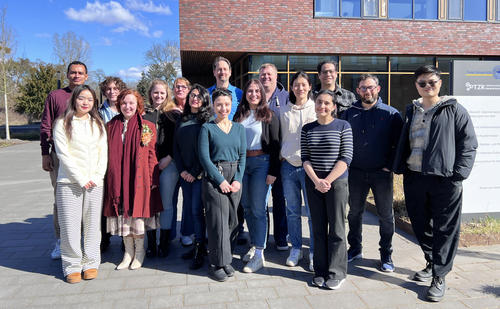Contribution to global food security
News from Jul 08, 2025
Thanks to continued funding from the German Research Foundation (DFG), the research group “ImmunoChick – Analysis of the Avian Immune Response in the Context of Infections” at the School of Veterinary Medicine at Freie Universität Berlin can continue its groundbreaking basic and applied research on infection control in poultry farming. ImmunoChick is one of seven DFG research groups led by Freie Universität Berlin and, following the recent decision to fund two new graduate programs at the School of Veterinary Medicine, is further proof of the school's research strength. Research groups (FOR) are usually interdisciplinary collaborations between several scientists that run for eight years (four years per funding phase) and contribute to establishing new areas of research. In addition to ImmunoChick, the DFG has extended funding for three other research groups throughout Germany and established seven new ones. In total, the DFG currently funds 188 research groups.
The research group “ImmunoChick – Analysis of the avian immune response in the context of infections” at the School of Veterinary Medicine at Freie Universität Berlin is a world-leading multidisciplinary project investigating the immune system of chickens. It is making an important contribution to the development of improved vaccines for poultry, the prevention of poultry and zoonotic diseases, and the strengthening of global food security. “Poultry is one of the most important sources of protein in the human diet worldwide, but it is severely threatened by infectious diseases. These also cause considerable animal suffering. Chickens in particular are a significant source of zoonotic pathogens that can be transmitted from animals to humans,” explains the spokesperson for the research group, Prof. Dr. Benedikt Kaufer from the Department of Veterinary Medicine at Freie Universität Berlin. “Chickens are also a key model for immunological research, providing fundamental insights into the immune response in poultry that can also be transferred to humans. Despite intensive research, however, surprisingly little is known about the immune system, disease development, and the mechanisms of action of vaccines in chickens. In our second funding period, we want to address these research gaps in the research group «ImmunoChick – Analysis of the avian immune response in the context of infections»”, Kaufer continues. “The aim is to better understand the immune and infection mechanisms in poultry that influence the course and severity of diseases. This knowledge will help to improve vaccines in a targeted manner and reduce animal suffering.”
Using globally unique, genetically modified chicken models, state-of-the-art immunological methods, and innovative molecular biological technologies, researchers from Germany and the UK will investigate how the immune system of chickens responds to various pathogens. To this end, the scientists will use special chickens in which certain immune cells – known as B cells and T cells – have been specifically eliminated. Using modern methods such as proteome and genome analyses, the researchers will investigate the immune responses to avian influenza viruses, Marek's disease, Gumboro disease, and bacteria that cause salmonellosis, a foodborne infection in humans. At Freie Universität Berlin, Prof. Dr. Benedikt Kaufer and his team are investigating how T cells and interferons control the immune response to the Marek's disease virus in chickens in order to better understand the mechanisms of protection and enable the development of more effective vaccines. (jkr)
